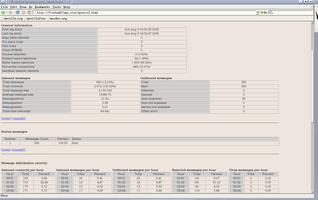| Option | Purpose |
| -h | print short help |
| -V | print version |
| -v | more detail info ouput |
| -c config | use this file as configuration file (default=/etc/mail/milter-quota.conf) |
| -p pipe | local socket (Unix domain socket) to data exchange with sendmail (default=unix:/var/spool/milter-quota/sock) |
| -i socket | local socket (Unix domain socket) to data exchange with user (default=unix:/var/spool/milter-quota/cmd) |
| -t timeout | operations timeout for socket of sendmail (default=0) |
| -u user | user's name, which rights will be used by milter-quota (default=_milter-quota) |
| -l vlevel | level of debugging print (default=0) |
| -d mode | working mode (0=daemon,>0=debug terminal) |
| -b bs_file | state file of blocking lists (default=empty) |
| -m ms_file | state file of messages control (default=empty) |
| -s cs_file | state file of preliminary cache (default=empty) |
| -x mbox_dir | catalog of user's mailboxes |
| -y ext_srv_addr | address of external server (quotas syncronization) |
| -z ext_srv_port | TCP port of external server (quotas syncronization) |
| -a | use blocking to access the configuration |
| -E | stop on any error |
| -C | dynamic control for configuration changing |
| -X | enable a support of regular expressions (POSIX.2) |
| -B | enable the dynamic lists (cache and blocking) |
| -M | enable control for messages volume and so on |
| -R | enable control for sendmail protection (control of rate connection) |
| -Q | enable control for user's mailbox quotas and so on |
| -q | use last in recipients list during message processing (default=first from list) |




